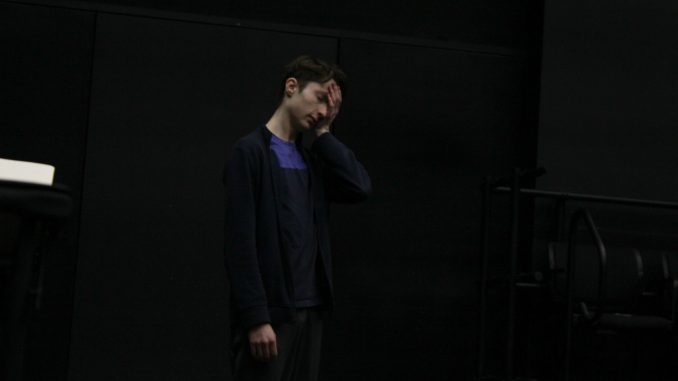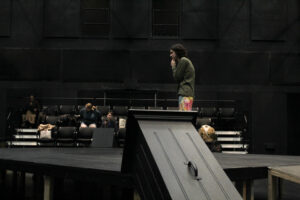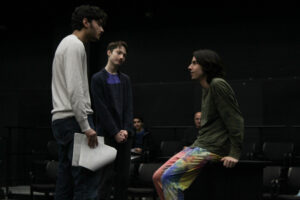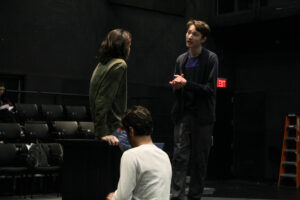
Everybody dies, but in Everybody, the title character, Everybody dies. Based on the 15th-century morality play, Everyman, was brought to the 21st century while maintaining its constantly rotating cast of characters. The cast of nine consists of very few characters who do maintain their roles, while the mantle of Everybody is passed around each night, and with it, their demise.
Evan Chartock ’25, Laisha Torres ’25, and Elliot Cetinski ’24 all play Everybody, but when they don’t play Everybody, they each take on two other roles, like Kinship or Strength. True to the morality play, each character represents a value or role, such as Destiny Young ’24, playing Girl and Time while Spencer Toth ’25 plays Death.
When asked about what it was like to be in a show where many of the roles change each night, Torres said, “I thought it would feel a lot more different than it did, but it low-key just feels like we’re doing different plays,” a sentiment echoed by fellow actors, like it was really three different plays rather than one. Levi Fitz ’26, who plays two or four roles out of a pool of six – depending on the night – said that “it feels more natural than you would think… [the Everybody’s] do such a good job of bringing something different every time. It feels like I’m doing one show with different flavors.” Toth said “it is pretty weird” since normally your reactions depend on the person, but it’s staged to have the same blocking every night, which helps. Joey Nolan ’24, the Usher and God, said that “my acting style is very in the moment. I don’t do a lot of prep for how I’m going to say my lines [so] it actually helps me to have something [keeping] me on my toes.” Kieran Drew ’25 agreed, saying, “It keeps for both us as a performance group and for the audience,” especially for those who attend multiple nights.
On performing in an updated morality play, Torres called it “super cool” and called attention to how heavy the themes were. “It’s talking a lot about death… the impact that you leave on people after you die and how time continues to go on.” The play makes “these really intense and impactful concepts” “palatable” and “easy to digest” via comedy, she said. “During rehearsals we’ll have lots of talks about what the scenes are doing,” comparing “what the show is doing at face value” as opposed to the depth of it. “The older play was still really comedic,” she said, but “you could tell it was a morality play… this one you can take it at that face value.” The themes below feel “so natural and it feels like two people talking,” she said. “It could be anybody [going] through this.” Young enjoyed how the production judged “how modern we want to go with things” while still honoring such a good script. Nolan noted the play was “a lot more interpretive” than realism and that “it’s super cool to try to embody things that aren’t people.” Fitz said he did not know about Everyman before the show began, but loved how the play “feels like they’re having a conversation for an hour and a half.” Chartock noted that he liked how the updated play made it more universal, especially for the cast that grew up with a variety of religious backgrounds. “It’s exciting to see that we can still all find this point of relatability in the unknown nature of death,” Chartock said. “It sounds morbid, but it’s something that’s connecting us through this piece.”
When the cast were asked about their favorite parts of the production, Nolan and Fitz both said their favorite was the end scene between Love and Everybody. It “marks a big tone shift in the play where it goes from being a lot lighter and silly to getting pretty serious,” Nolan said. He said he loved how it’s a “weird mix between somber and kind of hopeful… it’s about exploring death and all of its facets.” Toth said they particularly enjoyed using the trapdoor and going underneath the set. Young said she loved “how collaborative it is. Theater is very much an ensemble thing but especially in this show it’s very close-knit the type of connections you have to have with someone.” Kaya Eller ’25, playing First Somebody, Friendship, Beauty, and A, said she particularly liked Friendship’s monologue where she balances speaking very quickly yet understandable. Kiran Singh-Lefkovist ’27 and Kat Carrey ’27, assistant stage managers also picked the Love scene as their favorites. Drew said he was happy to be back at Ursinus after a (certainly theater-packed) study abroad at the University of Glasgow last autumn. It was nice to be “able to ease back in with something familiar,” he said, as he had studied this in a previous class with Dr. Scudera.
If there is anything the audience should know before attending the production, it is to leave all expectations behind and to know that, even though “the show is presented really comedically, really fun and natural… it will hit you at some point what this play is really about,” Toth and Torres said. “There’s one scene where [I watched] someone else be Everybody and I was tearing up. Like it hits you [and] it hit me like ‘oh my gosh. This is really what it is about,’” Torres continued.
To discover the different versions of Ursinus’ Everybody, directed by Dominic Scudera, attend the shows on February 21, 22, 23, and 24th at 7:30pm and February 25th at 2pm in the Kaleidoscope. Tickets are available in cash at the door as well as online, and follow @UCTheaterDance to stay up to date on all things theater and dance.



